Colorado Lawmakers Nudge RTD to Provide Bigger Fare Discounts for Low-Income Transit Riders
RTD Board of Directors doesn't want the assistance.

Frustrated by the Regional Transportation District’s inability to provide sufficient fare discounts for low-income transit riders, some state lawmakers want to help the agency beef up its new fare pass program.
House Bill 1401, sponsored by representatives Faith Winter and Dominique Jackson, passed the Transportation and Energy Committee Wednesday in an 8-6 vote. It allocates $80,000 to a division of the Colorado Department of Transportation that would pass the funds to RTD. The money is earmarked to jump-start a fare pass program to give low-income residents a 50 percent fare discount.
That’s bigger than the 40 percent discount RTD is mulling, but the RTD Board of Directors doesn’t want the money. Board Chair Doug Tisdale testified against the bill Wednesday, reflecting the position of all 15 board members.
“We respectfully request that we don’t require the legislative action to implement something that we are already doing,” Tisdale said at the committee hearing.
While RTD is moving forward with an overhaul of its fare passes, advocates say the plan could be better for low-income residents.
The Pass Program Working Group, convened by RTD over the past year, was tasked with recommending fairer discounts and more convenient pass options that would increase transit ridership at no additional cost to the agency. The group came up with a proposal that includes a 40 percent discount for residents making less than 185 percent of the poverty level (about $46,000 for a family of four). The task force agreed, in theory, that a 50 percent discount is ideal, but couldn’t make the math work.
Affordable fare advocates, including reps from 9to5 Colorado and Mile High Connects, think RTD should accept what legislators are offering. “The working poor” need fares cut in half to get to work, school, daycare and the grocery store more than ever, said Jenee Donelson, a transit organizer with 9to5.
“This bill is a great first step in making sure the resources that are going towards transportation also address the needs of the under-served and transit-dependent communities,” Donelson said. “We also strongly agree with the bill’s recommendation to implement a full 50 percent discount… by exploring additional revenue sources. Like this one.”
Low-income residents comprise a little more than half of RTD’s riders, according to a 2016 analysis by the Colorado Fiscal Institute. Yet the transit agency caps the budget for its current income-based fare pass program at $6.8 million a year, limiting its reach. With another fare increase probable in 2019, those residents will have to spend a greater percentage of their paychecks on daily transportation needs.
Asked by Representative Jeff Bridges if RTD would implement a fare hike before expanding discounts, District K Director Paul Solano said, “We definitely would not do that.”
Winter admitted after the hearing that the legislature cannot legally force RTD and its independently elected board to adopt a certain discount, but believes the legislature can be influential. “We want them to get the program up and running,” Winter said. “We wanted to push for the better standard.”
The RTD Board of Directors can still change the fare package to include a 50 percent discount. “I think that this is important enough to not just assume that we are restricted by the funding,” District I Director Judy Lubow said during a Board study session Tuesday. “I think, personally, we should seek more RTD funding but also much more private funding.”
The Board could also provide fewer discounts than recommended. District J Director Larry Hoy, for example, questioned the notion of discounts for school kids during a study session Tuesday. “How much more do we need the taxpayer that doesn’t get on the bus to pay?” Hoy said. “That’s the problem I have.”
The Board will likely vote on the fare pass overhaul this summer. HB 1401 heads to the House floor next.


